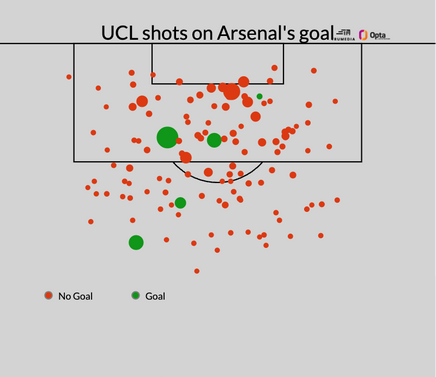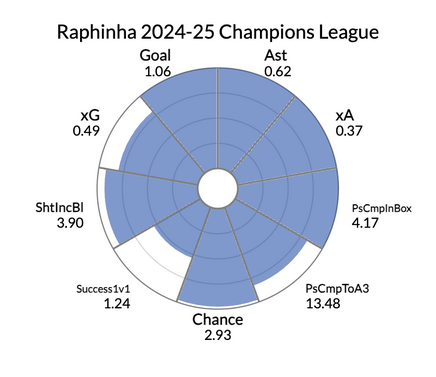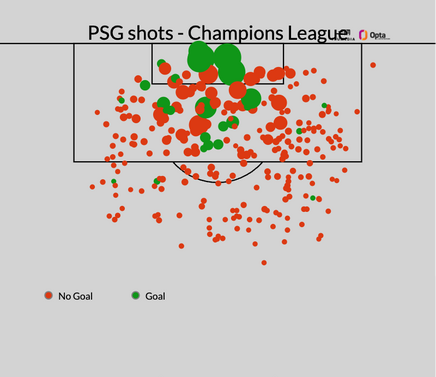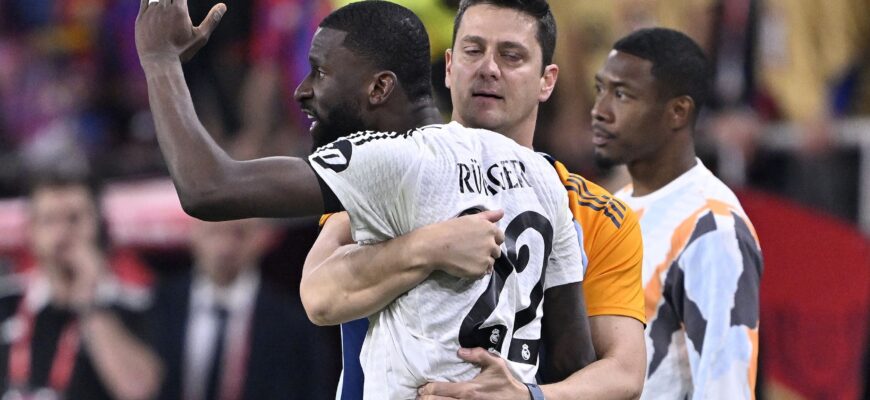Only three matches remain in the quest for the ultimate prize in European club football. At this stage, past performance matters less than the opportunity ahead. Arsenal, Barcelona, Inter, and Paris Saint-Germain all enter the final stretch with a credible chance of lifting the trophy in May.
However, none of these teams are without flaws. Each has faced defeat in the competition already. While three of the semi-finalists finished second, third, and fourth in the league phase, the team that narrowly qualified through the knockout playoffs is just as strongly favored. This appears to be an exceptionally balanced field of contenders.
So, what factors might propel one of these teams to victory, or conversely, lead to their downfall? Let`s explore below.
1. Arsenal
Why they will win the Champions League: Defense Secures Titles
While Inter might have conceded fewer goals, no remaining team restricts opponents` attacking opportunities quite like Arsenal. Over 12 matches, they`ve allowed an average of just 0.69 non-penalty expected goals (npxG) per game. By most statistical measures, Arsenal`s defense is elite. They restrict opponents to only 16.4 touches in the penalty box per game, nearly five fewer than any other team in the final four, and concede just 10.3 shots per game. This impressive record holds true even after facing a potent attack like Real Madrid`s, which struggled to generate expected goals until a defensive error.

TruMedia
The old adage that defense wins championships often rings truest in the Champions League. Over the past six seasons, Real Madrid is the only club to win the competition while allowing more than one npxG per game. Only four teams during this period have allowed 0.7 npxG or less; two of these reached the final in 2021, and another was the Manchester City side that missed penalties against Real Madrid in the 2024 quarterfinals.
Why they won`t win the Champions League: Scoring Form May Decline
Arsenal is a highly effective team, and like most contenders at this stage, the case for them winning is stronger than the case against. Beyond a general sense that they might lack big-stage experience and concerns about a central striker (less felt since Bukayo Saka`s return), there are few obvious weaknesses. However, one potential concern is that their scoring output has significantly exceeded the quality of their chances.
They`ve scored 30 goals from 22.82 xG; no other team remaining has benefited more from clinical finishing (the post-shot value minus pre-shot value). Arsenal has been incredibly clinical in this competition, with moments like Declan Rice`s rare free-kick brace and Ethan Nwaneri`s stunning strike. In theory, their xG should eventually regress closer to the mean, although there`s no guarantee this will happen over the remaining matches. Conversely, this is also a team that has previously failed to score from over two xG in crucial cup ties. Mikel Arteta will hope history doesn`t repeat itself.
2. Barcelona
Why they will win the Champions League: Possessing Key Talent
A sign of Barcelona`s strength is that it`s unclear which player might be referred to as their `best`. Lamine Yamal? Perhaps too early. Robert Lewandowski? A tempting thought, but he`s injured… Pedri? That might be it. However, looking at Champions League output, Raphinha is the standout. Cristiano Ronaldo holds the record for goal involvements in a single season (21 in 2013-14). With potentially three games left, Raphinha is on 19. While he`s had more matches to accumulate this total, it remains an awe-inspiring contribution from the former Leeds player.

TruMedia
Raphinha leads the competition not only in goal involvements but also in assists and big chances created. Only two opponents so far – Monaco and Brest – have prevented him from having a direct impact on the score sheet. He`s nearing legendary club records; two more goals match Lionel Messi`s best European scoring season for Barcelona, and two more assists tie the club and Champions League record held by Luis Figo.
Why they won`t win the Champions League: Vulnerability in the High Line
Hansi Flick`s tactical approach since taking the Barcelona job has been a clear gamble. Implement an extreme version of Bundesliga football – featuring an aggressively high defensive line and intense pressing – and trust that the forwards and midfielders can apply enough pressure to prevent the defense from being exposed by balls played over the top. This has largely been successful, particularly in La Liga, where it`s a stark contrast to the league`s emphasis on technique over athleticism.
However, in the Champions League, moments of vulnerability have appeared. Benfica exploited Barcelona`s defense by playing long balls and winning second balls. Borussia Dortmund used speed on the flanks to break the offside trap and might have come even closer to overturning a four-goal deficit if they hadn`t mistimed some runs.
Barcelona`s defense can be breached. Their backline allows more through balls than any other team remaining in the competition. They have conceded more xG from counter-attacks than Arsenal, PSG, and Inter combined.
3. Inter
Why they will win the Champions League: Recent Tournament Experience
Having been a fixture in the knockout stages for the last four years, reaching the final in 2023 and providing stern tests for Liverpool and Atletico Madrid in previous campaigns, this Inter side possesses significant big-game experience in the Champions League. Over the last five years, 13 players on Simone Inzaghi`s roster have accumulated 30 or more games in this competition. PSG have nine players with this level of experience, Barcelona six, and Arsenal none.
Inzaghi has benefited from a squad that hasn`t undergone radical changes. Eight of the players who started the defeat to Manchester City in the Istanbul final are still part of the squad; indeed, seven were in the starting lineup that drew with Bayern Munich in the quarterfinal. This stable core has made it easier for newer, relatively younger players like Yann Aurel Bisseck and Marcus Thuram to integrate and make valuable contributions. This is not a team likely to shy away from the pressure of the upcoming matches.
Why they won`t win the Champions League: Offensive Limitations
Unfortunately for Inter, all that experience hasn`t yet translated into the profile of a potential Champions League winner. While anything is possible when you`re three games away from the trophy, the evidence so far suggests they might be a step behind the other contenders. A goal difference of plus 14 is respectable, but the fact that they`ve only conceded five goals appears largely due to excellent goalkeeping from Yann Sommer and notably poor finishing from their opponents. While there might be reasons why top strikers like Erling Haaland, Harry Kane, and Gabriel Jesus have had off-nights against Sommer, relying on this pattern to continue against Barcelona is a risky bet.
Crucially, Inter`s attack doesn`t seem championship-caliber either. Their output in front of goal has been significantly boosted by the six penalties they`ve won (four converted). Fifteen non-penalty goals from 12 games and 1.36 npxG per game are relatively low numbers for a potential champion. Their npxG difference, at 0.33 per game, is less than half of the third-ranked team, Barcelona, placing them as the 11th best team overall in the competition by this metric. Of course, some teams ranked higher didn`t face as many top opponents as the Italian champions. Still, the underlying statistics don`t strongly suggest Inter are future champions.
4. Paris Saint-Germain
Why they will win the Champions League: Effective Pressing Strategy
The narrative suggests that Luis Enrique`s PSG is finally shedding its reliance on individual stars and becoming a genuine team, perhaps for the first time since the Qatari takeover. This shift is reflected in a playing style dictated more by the midfield`s control than by isolated forwards, and a collective attacking approach where players interchange fluidly.

TruMedia
Most significantly, this new PSG`s strength is evident in their play when they don`t possess the ball. While the data sample is slightly larger than the previous season, the visual data clearly indicates increased effectiveness in winning the ball back. Few teams press as effectively as Luis Enrique`s side.
Their average of 9.2 passes allowed per defensive action is the second fewest in the competition, a significant improvement from 13.5 two years ago. No team recovers the ball more frequently in the opponent`s half (front two-thirds of the pitch), averaging 31.1 recoveries per game. According to Wyscout, they also win more defensive duels.
Why they won`t win the Champions League: Preference for Low-Quality Shots
Similar to Arsenal, PSG doesn`t have an obvious major flaw in their record (Barcelona might, but Flick`s side is arguably just as likely to win as anyone). Injuries in key positions, particularly at center forward or full back, could derail them. Assuming full fitness, however, one potential issue in their attack, which a team like Arsenal could exploit, is a tendency to take low-quality shots when initial attacks are thwarted.

TruMedia
While the image shows many shots with high xG values, there is also a notable number of speculative efforts. Their average xG per shot (0.107) is significantly below the Champions League average, and 34.8 percent of their shots come from outside the box, the highest proportion among the final four. No winner of this competition in the last six years has had a below-average xG per shot. More concerningly, shot quality has dipped in big games; against Liverpool and Aston Villa, their average xG per shot dropped to 0.087. While spectacular long-range goals happen, relying on a diet of hopeful strikes will play right into the hands of a solid defense like Arsenal`s in the semifinals.









